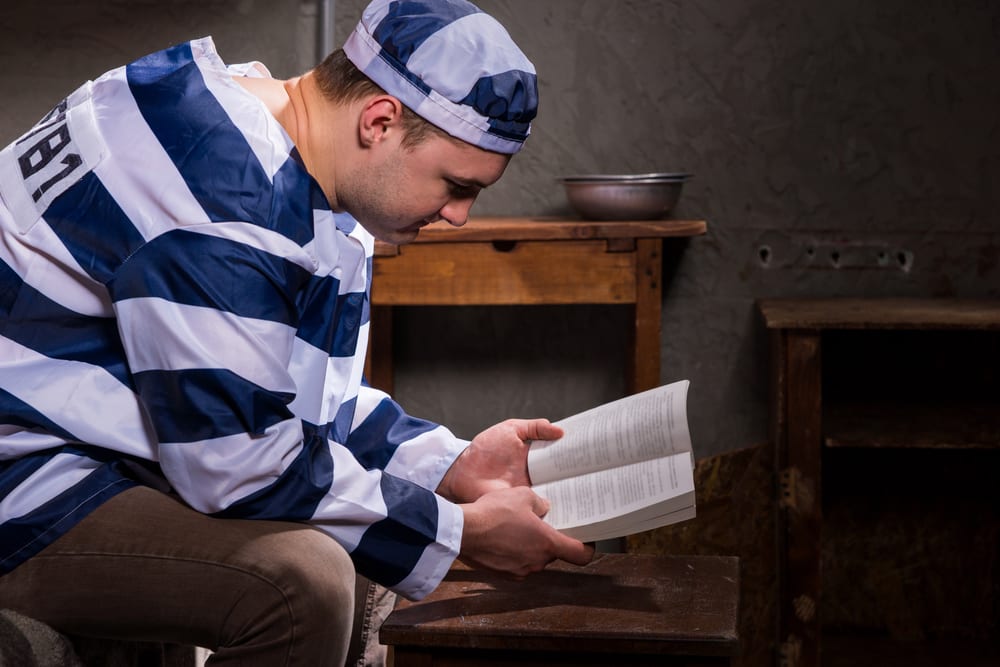This is a guest post by Andrew Seidel. He is an attorney for the Freedom From Religion Foundation and his first book, The Founding Myth: Why Christian Nationalism is Un-American will be released in May.
…

As 2018 drew to a close, some on the political right and in the FOX News crowd raged because they discovered that the federal government funded the Nation of Islam, making it possible for the extreme group to go into prisons and minister to inmates. Well, if you’re angry about that — and you should be, though you should also take anything FOX News reports with a shaker of salt — then sit down, I’ve got a few things to tell you.
Religion has a significant presence in our prisons. Only 0.1 percent of federal inmates are atheists, a number significantly smaller than the country as a whole. But even so, religious groups also see prisons as mission fields. Prisons often have chaplains, and, despite the banner FOX headlines, they’re rarely from the Nation of Islam.
Prisons are a fertile ground for preachers. Not only are prisoners quite literally a captive audience, but there are a lot of them. America locks up more citizens than any other country.
We have a few obvious goals when it comes to imprisoning offenders. Safety: We lock people away so they can’t harm anyone else. Punishment: you broke the rules or violated someone’s rights and, as a result, you lose some of your rights. Rehabilitation: Some people have problems that the state can try to fix.
This last goal is probably one of the main reasons there is so much religion in our prisons (though there shouldn’t be). When it comes to religion, we bend over backward to accommodate inmates. For instance, our prison system lets inmates grow facial hair in the name of their god or eat off a menu dictated by their faith. Even when we don’t accommodate the beliefs, the prisoners are emboldened to ask, often pushing the limits of the absurd. To top it all, we’ve got a law in addition to the First Amendment, RLUIPA, meant to protect prisoners’ religion.
This protectionism often manifests as favoritism for Christianity over other minority religions, especially when it comes to Native Americans, Sikhs, Muslims and Humanists. In one case, the prison banned all books, magazines, and literature, except the Bible. And of course, the system favors religious prisoners, who are given all manner of extra privileges over non-religious individuals, exerting pressure on the latter group to convert in order to access those privileges.
Religion’s access to the penal system is predicated on an ancient myth: that religious people are good people. The new bipartisan criminal justice reform, much touted, enshrines this favoritism and has significant constitutional problems as a result. It’s a myth that many of the founders mistakenly believed in, something I examine and disprove in my forthcoming book.
The interminable child rape scandal of the Catholic Church also disproves the point, at least anecdotally. But for a more thorough disproof, there are countless studies from modern social science. As sociologist Phil Zuckerman has explained in a meta-analysis of those studies:
Murder rates are actually lower in more secular nations and higher in more religious nations where belief in God is deep and widespread. And within America, the states with the highest murder rates tend to be highly religious, such as Louisiana and Alabama, but the states with the lowest murder rates tend to be among the least religious in the country, such as Vermont and Oregon.
In fact, when any given factor of societal health or well-being is measured, it is invariably the less religious countries that score higher. While this does not prove a causal link, that argument can be made. Thomas Paine argued as much back in 1797: “Accustom a people to believe that priests or any other class of men can forgive sins, and you will have sins in abundance.”
Public funds should not flow to the Nation of Islam for a number of reasons, the separation of state and church foremost among them. But more generally, our society — and specifically our legislatures — should re-evaluate our penal system’s overreliance on religion. Religion does not make people behave more morally — and religious outfits are simply using the system to pressure a vulnerable population into following their particular brand. We need to recognize this reality, instead of falling for falsehoods about the redemptive power of religion.
(Image via Shutterstock)




It’s Moving Day for the Friendly ..."
It’s Moving Day for the Friendly ..."
It’s Moving Day for the Friendly ..."
It’s Moving Day for the Friendly ..."